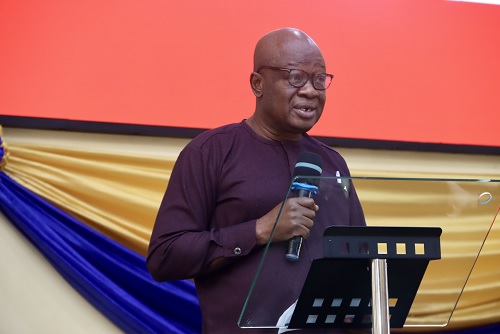
Give teachers space to shape education policies — Prof. Arku
The Vice-President of the Ghana National Association of Teachers (GNAT) Institute for Research and Industrial Relations Studies (IRIRS), Professor Frank S. Arku, has stressed the need for teachers to be given the space to shape education policies in the country.
He said over 80 per cent of teachers in 123 countries were not consulted when new education policy or curricular reforms were introduced, as captured by Education Internation in 2019.
Prof. Arku said this when he presented a paper on "Shaping and Sharpening Young Educators" on the topic "Empowering the Next Generation" at the 76th New Year School in Accra last Wednesday.
Event
The School of Continuing and Distance Education at the College of Education is collaborating with various partners to organise this year's New Year School.
The event is on the theme; Attaining the Five Ps of Sustainable Development for a Resilience Ghana:People, Planet, Prosperity, Peace and Partnership.
Prof. Arku said teachers were very important in the achievement of the Sustainable Development Goal Four (SDG 4) which, among other things, focused on inclusive, equitable and quality education for all.
He said as the deadline approached in 2030, the importance of teachers in its achievement could not be overemphasised.
That, he said, was because they were to ensure that the learners acquired the knowledge and skills needed to promote sustainable development.
"However, in 2022, UNESCO maintained that due to the global shortage of teachers, the progress towards SDG Four was at risk," he said.
Prof. Arku said young people could not be abandoned when the country wanted to achieve a lot in education.
He said research conducted by GNAT showed that about 70 per cent of teachers were less than 40- years-old, meaning most of the teachers were young.
The statistics, he said, also showed that about 20 per cent of new teachers left the profession three years after joining it.
On the global front, Prof. Arku indicated that the teaching profession was not attractive to about 69 per cent of young people.
"That is amazing," he said and again mentioned that research also conducted in a district in the country showed that about 64 per cent of the study participants were looking for opportunities to leave the teaching profession.
The vice-president of GNAT IRIRS said one of the challenges faced by young people was the navigation of earlier career studies.
The solution, he said, included the improvement of the working conditions of teachers.
Some teachers, he said, were leaving due to the poor conditions of teachers.
Mentor
He said there was a need to mentor young teachers and give them the autonomy to excel, adding that those teachers needed models and not critics.
"Ghanaians like to criticise," he said and "We don't put people in good shape for them to be able to work hard".
Prof. Arku said young educators needed to be encouraged to enable them to offer their best.
Also, he said there was a need to create networks of Professional Learning Communities (PLC).
